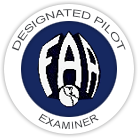Instrument Rating Exam
The instrument rating is added to a private pilot (or sometimes commercial certificate) to allow the pilot to operate under instrument flight rules (IFR). IFR flying involves learning to fly the airplane solely by reference to instruments and comply with specific procedures within the air traffic control system. Without visual references to the ground, horizon, and other landmarks, you will be able to fly through clouds, rain, fog, etc., all of which restrict visibility. This skill is particularly useful when you fly long distances. It is frequently difficult to travel such distances without encountering weather systems requiring instrument pilot skills. As you can imagine, the instrument rating demands a great deal of time and effort, but the reward is the freedom to operate in all types of weather.
Basic Requirements:
- Hold a Private Pilot Certificate and at least a Third Class medical
- Be able to read, write, speak and understand English
- Accumulate flight experience per FAR 61.65:
- Must have at least 50 hours of cross-country flight time as pilot in command, which can include solo cross-country time as a student pilot. Each cross-country must have a landing at an airport that is at least a straight-line distance of more than 50 NM from the original departure point.
- Must make at least one cross-country flight that is performed under IFR and transits a distance of at least 250 NM along airways or ATC-directed routing and includes an instrument approach at each airport so that a total of three different kinds of instrument approaches are performed.
- Also need a total of 40 hours of actual or simulated instrument time, including a minimum of 15 hours of instrument flight training from a Flight Instructor certified to teach the instrument rating. (CFI-I)
- Up to 10 hours of the instrument training may be accomplished in an approved flight simulator or flight training device if the training was provided by an authorized instructor.
- In the 2 calendar months prior to the practical test, the candidate needs to log 3 hours of instrument training in an airplane that is appropriate to the instrument-airplane rating from a CFI-I in preparation for the test.
- Receive and log training, as well as obtain a logbook endorsement from your CFI-I on the following areas of operation: preflight preparation, preflight procedures, air traffic control clearances and procedures, flight by reference to instruments, navigation systems, instrument approach procedures, emergency operations, and post-flight procedures.
The Instrument rating checkride involves an oral exam followed by the flight portion. The oral portion will take about two hours, the flight about an hour and a half or so. The total time to schedule for this checkride is approximately 4 hours. You will work with your instrument flight instructor (CFI-I) to cover everything needed to pass the checkride.
To see specifically what will be covered during the checkride, you may click on the link provided to see the Instrument Rating ACS or Airman Certification Standards...

